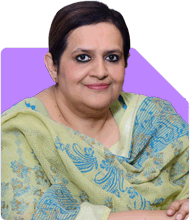Can my 53-year-old wife who hasn't had periods for 6 years get pregnant?
Dr Nandita Palshetkar | Answer |Ask -Follow
Gynaecologist, IVF expert - Answered on Nov 25, 2024
She is a pioneer in ICSI, laser hatching, spindle view, oocyte and embryo freezing, IMSI, in vivo vaginal culture, metabolomics, embryoscope and spindle check technologies.
With over 30 years of experience, Dr Nandita is managing 10 centres across India.
She has written over 100 papers, edited 25 books and given over 1,000 lectures and speeches.
She has also won several prestigious awards, including the Dronacharya Award (2021), the Bharat Gaurav Award at the House of Commons in London (2014) and the Inspiring Gynaecologists of India (2018) to name a few.
Dr Nandita completed her MBBS from Grant Medical College and Sir J J Hospital, Mumbai, and her MD in obstetrics and gynaecology from Mumbai University."... more

my wife is 53 year old have menopause (no Periods) since last 6 years , she have any chance of pregnancy
So, it's impossible to become pregnant after menopause, until you undergo infertility treatment
You may like to see similar questions and answers below
Dr Archana Bajaj | Answer |Ask -Follow
Gynaecologist, Obstetrician, IVF Expert - Answered on Mar 14, 2023
Anu Krishna |1746 Answers |Ask -Follow
Relationships Expert, Mind Coach - Answered on Mar 20, 2023
Dr Hemalata Arora | Answer |Ask -Follow
General Physician - Answered on Aug 20, 2023
Dr Karthiyayini Mahadevan | Answer |Ask -Follow
General Physician - Answered on Feb 18, 2024
Dr Karthiyayini Mahadevan | Answer |Ask -Follow
General Physician - Answered on Mar 27, 2024
Nitin Narkhede |113 Answers |Ask -Follow
MF, PF Expert - Answered on Dec 15, 2025
Nitin Narkhede |113 Answers |Ask -Follow
MF, PF Expert - Answered on Dec 15, 2025
Ramalingam Kalirajan |10893 Answers |Ask -Follow
Mutual Funds, Financial Planning Expert - Answered on Dec 15, 2025
Ramalingam Kalirajan |10893 Answers |Ask -Follow
Mutual Funds, Financial Planning Expert - Answered on Dec 15, 2025
Radheshyam Zanwar |6746 Answers |Ask -Follow
MHT-CET, IIT-JEE, NEET-UG Expert - Answered on Dec 15, 2025
Ramalingam Kalirajan |10893 Answers |Ask -Follow
Mutual Funds, Financial Planning Expert - Answered on Dec 15, 2025
Ramalingam Kalirajan |10893 Answers |Ask -Follow
Mutual Funds, Financial Planning Expert - Answered on Dec 15, 2025
Ramalingam Kalirajan |10893 Answers |Ask -Follow
Mutual Funds, Financial Planning Expert - Answered on Dec 15, 2025
Samraat Jadhav |2508 Answers |Ask -Follow
Stock Market Expert - Answered on Dec 15, 2025
Ramalingam Kalirajan |10893 Answers |Ask -Follow
Mutual Funds, Financial Planning Expert - Answered on Dec 15, 2025






























